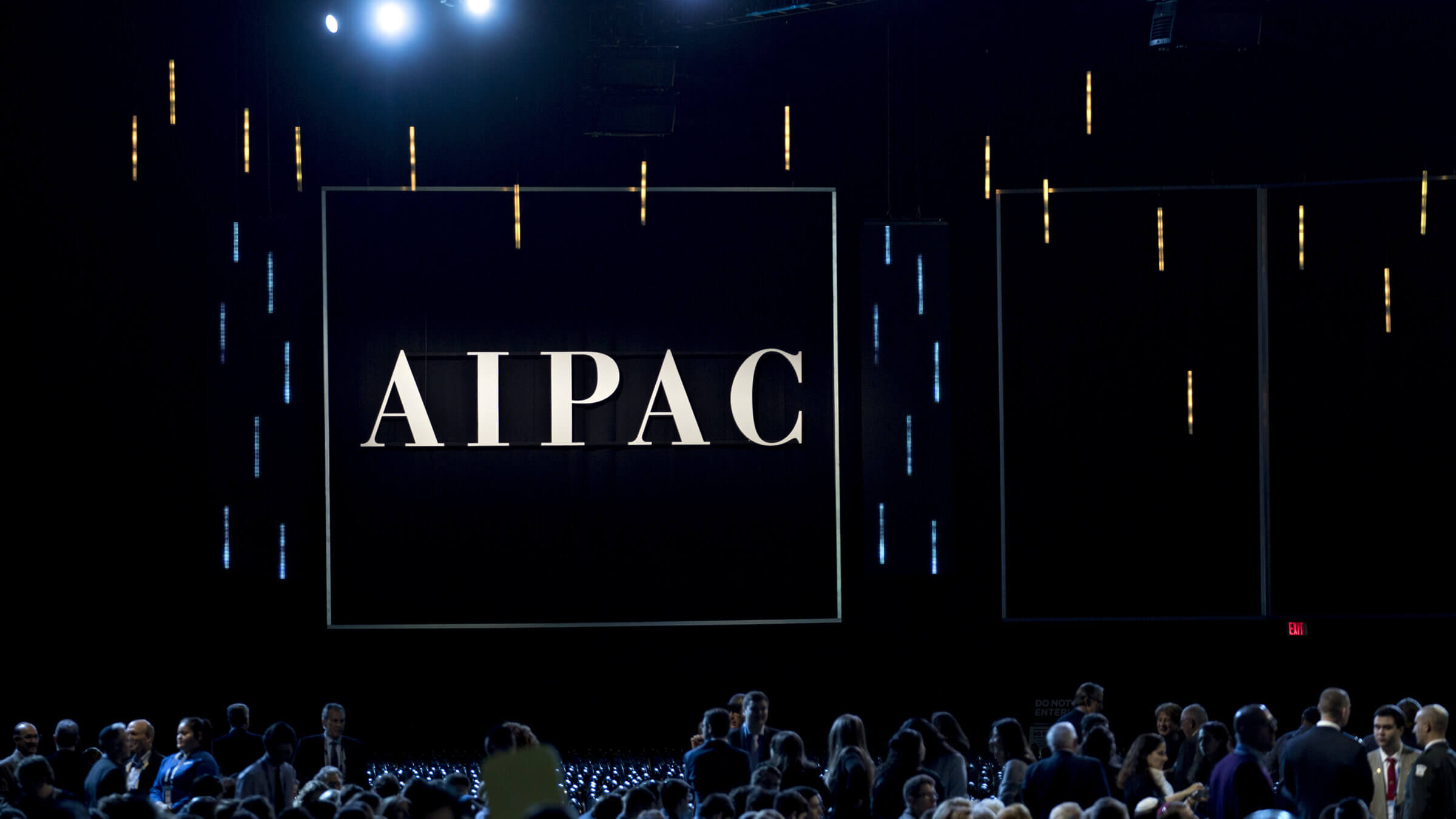AIPAC’s new high-risk, low-reward political strategy
In the long run, the pro-Israel lobby’s pivot to negative electioneering will fail

The AIPAC logo is displayed during the policy conference in Washington, D.C., U.S., on March 25, 2019. Photo by Andrew Harrer/Bloomberg via Getty Images
Tuesday’s Maryland primary results showcased the latest battleground — and engagement rules —for AIPAC’s new high-profile/high-risk political strategy.
In the Democratic primary for Maryland’s 4th District bordering Washington, D.C., AIPAC’s favored candidate, Glenn Ivey, defeated 10-year House veteran Donna Edwards with the aid of millions in anti-Edwards advertising spent by AIPAC’s PAC and super PAC, United Democracy Project. Yet all those millions in advertising fail even to mention Israel or Edward’s record on Israel-related issues.
When the venerable pro-Israel lobby announced last December its new strategy and tactical approach, it was personal for me. My professional career as a pro-Israel advocate began in the Washington offices of AIPAC. I served as staff for AIPAC’s very first political director, including preparing briefings for heavy-hitter political insiders attending AIPAC’s annual Policy Conference, helping co-found a national pro-Israel PAC, directing a Colorado pro-Israel PAC and escorting congressional candidates on tours of Israel. During the 2000 election cycle, I became a candidate myself, winning the Democratic nomination to run for Colorado’s 6th congressional district.
Now I see AIPAC’s new, highly public, money-focused political strategy as not only very risky but leading to a low return over the long term. AIPAC intends to wield influence in the political arena not through the strength of its argument that staunch U.S. support of Israel is in America’s national security and moral interests, but rather by wielding hardball negative electioneering to take out perceived opponents of the historic U.S./Israel relationship.
In the midst of the highly charged post-Jan. 6 atmosphere, AIPAC’s endorsements of over 100 Republican election-deniers have publicly associated AIPAC with the insurrection and criminal conspiracy to keep Trump in office just last year.
Who can honestly argue this serves to strengthen the U.S.-Israel relationship?
The December 2021 announcement by AIPAC leadership that they would abandon previous standards by setting up the PACs and offering public endorsements rendered the phrase “AIPAC neither rates nor endorses members of Congress or candidates for federal office” inoperable. AIPAC has publicly endorsed and spent millions to help elect favored candidates or defeat others, all before the November 2022 general election campaigns have begun. Reportedly, the organization allocated over $8.5 million of its funders’ contributions to its PAC and super PAC budgets this year, canceling the annual Policy Conference — a space where AIPAC used to nurture strong relationships — for the foreseeable future.
Recent media coverage has publicly acknowledged AIPAC’s new political spending strategy as “the most consequential development in the 2022 Democratic primary cycle.”
In most cases, the independent expenditure advertising campaigns initiated by AIPAC’s United Democracy Project super PAC are wholly disconnected from policies relating to the U.S.-Israel relationship. Instead, they are targeted, negative campaign advertising meant to discredit and throw a harsh light over “unapproved” candidates running in Democratic House primaries.
A notable exception is a very closely contested Aug. 2 Detroit-area Democratic House primary pitting two sitting incumbent members of Congress forced by redistricting to run against each other.
In this very high-profile House Democratic primary AIPAC’s PAC is spending millions to defeat incumbent Jewish Rep. Andy Levin, who hails from the pro-Israel legacy of his father and uncle who served for decades before him. AIPAC’s PAC and super PAC demonize Levin, labeling him “anti-Israel” for advocating a two-state solution while disregarding Levin’s vote in favor of Iron Dome funding just a few months ago.
While the truism that “money is the mother’s milk of politics” still rings true today, over the long run AIPAC simply cannot spend its way to a supportive Congress. It must win the argument and friends on the strength of the merits and strong relationships, not via intimidation or money-fueled power politics.
As a former congressional candidate myself, I know negative campaign tactics lose effectiveness over time, and any single contribution carries a decreasing amount of influence.
What, then, will AIPAC have left, but its diminished reputation?
To contact this author, email [email protected].















